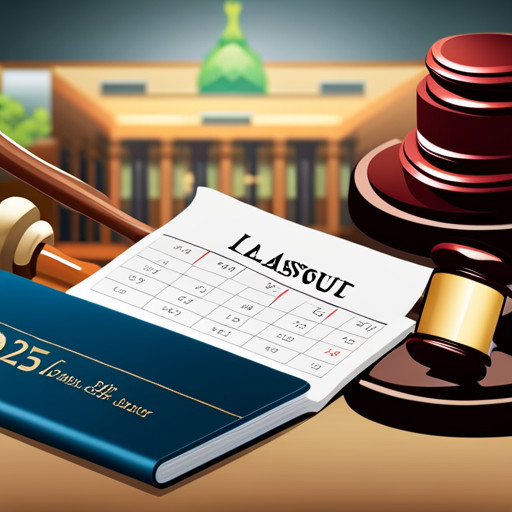Can You Sue the Government for Personal Injury How and When to File a Claim
Understanding the intricacies of filing a government injury claim, identifying the correct agency for claims submission, adhering to regulatory deadlines, and recognizing the qualifications for tort claims form the basis for this discussion.

The article elucidates the process, conditions, and possibilities of legal recourse against the government for personal injury, providing a comprehensive guide for potential claimants navigating the complex landscape of government liability in personal injury cases.
Key Takeaways
- Filing a Notice of Claim is required for most government personal injury claims, and it should include your name, address, and details of the injury.
- Use the proper government claim form and calculate the full value of your claim, using Standard Form 95 for federal claims and checking the agency's website or calling for state or local claims.
- File federal claims with the specific government agency where the injury occurred, while state and local claims should be filed with the central agency that handles claims.
- Be aware of the deadlines for filing government injury claims, which vary depending on the jurisdiction and can range from 30 days to two years from the date of injury. Missing the deadline may result in losing the right to make a claim or file a lawsuit.
Understanding the Basics of Filing a Government Injury Claim

Filing a government injury claim necessitates several critical steps. These steps include the submission of a Notice of Claim, using the correct government form based on the jurisdiction of the claim, and adhering to specific filing deadlines. These steps serve to establish a credible case against a government agency for personal injury.
It is imperative to understand the importance of evidence in substantiating the claim. This evidence may encompass physician reports, medical bills, and proof of lost income. By providing this evidence, the claimant strengthens their case and increases the likelihood of a successful outcome.
Furthermore, awareness of government liability exemptions is crucial. Not every injury incurs a cause of action against a government agency. For instance, intentional harm by a government employee may exempt the government from liability. Understanding these exemptions is essential in determining the viability of a claim.
Overall, understanding these fundamentals aids in navigating the complex process of filing an injury claim against a government agency. By following the necessary steps, providing sufficient evidence, and being aware of liability exemptions, claimants can increase their chances of obtaining the compensation they deserve.
Identifying the Correct Place to File Your Notice of Claim

Identifying the appropriate agency for the submission of the Notice of Claim is a crucial step in the process of seeking compensation for negligence. The correct agency for filing depends on the jurisdiction involved: federal, state, or local.
For federal claims, the specific government agency where the incident occurred is responsible. State and local claims are typically filed with the central agency that handles such concerns. Incorrect filing can lead to rejection, thereby necessitating the importance of identifying appropriate government agencies.
Given the complexity of the process and the stringent deadlines, seeking legal assistance is advisable. Lawyers specializing in government injury claims can provide invaluable guidance, ensuring that the Notice of Claim is correctly filed, thus increasing the likelihood of a successful compensation claim.
The Importance of Adhering to Government Deadlines

Adherence to designated deadlines is paramount in the process of seeking compensation for negligence. These deadlines may vary depending on the jurisdiction and the nature of the claim. Understanding the implications of missing government claim deadlines is crucial. Failure to meet these deadlines can result in the forfeiture of the right to seek redress.
The impact of government claim deadlines on personal injury cases is significant. These deadlines often dictate the timeline and strategy of legal action. Specificity is key in these instances, with deadlines ranging from 30 days to two years. The agency's response time also contributes to this timeline.
An overlooked or neglected deadline not only compromises the claimant's case but can also lead to the outright dismissal of the claim.
Navigating the Government Injury Claim Process

Navigating the process of seeking compensation for negligence involves several steps. These steps include the submission of the appropriate forms, understanding where to send these documents, and anticipating potential responses from the relevant agencies.
It is crucial to note that the challenges of this process include tight deadlines, complex legal language, and the possibility of rejection for errors. Therefore, meticulous attention to detail is required.
Tips for a smoother journey include the use of the correct government claim form and ensuring a comprehensive calculation of the claim's full value. Knowledge of the agency responsible for handling the claim can prevent unnecessary delays.
Lastly, preparedness for a response from an insurance adjuster representing the responsible government agency can aid in successful negotiations.
Recognizing Qualified Government Tort Claims

Understanding the specific conditions under which an action against a public agency is permissible constitutes a critical aspect of the process. For a tort claim to qualify, the acting government employee must have been on duty and within their official capacity.
Intentional harm inflicted by an employee might lead to exemptions from government liability. Cases can also be established for injuries resulting from hazardous conditions on government property. Proving government liability entails demonstrating ownership, existence of a dangerous condition, knowledge of the hazard, and failure to rectify it.
Thorough comprehension of these conditions enhances the potential for successful claim resolution, while recognizing the exemptions aids in avoiding futile legal pursuits.
Frequently Asked Questions
What Are the Legal Consequences if a Government Employee Intentionally Harms Someone While off Duty?
Off-duty liabilities of government employees involve distinct legal considerations.
If an employee intentionally harms someone while not performing official duties, this typically falls under the realm of the employee's private actions. In such cases, the government may not be held liable for damages.
Instead, the individual employee may face personal legal consequences, including potential civil suit for personal injury and criminal charges, depending on the severity of the harm inflicted.
Are There Any Exceptions to the Rule That the Employee Causing the Injury Must Have Been on Duty and Acting Within Their Official Capacity to File a Claim?
Are there exceptions to the rule regarding on-duty, official capacity conduct in personal injury claims? Indeed, there are.
Under the doctrine of 'Negligence Exceptions', off-duty actions can create liability if they are sufficiently linked to the employee's official role.
'Misconduct Implications' also come into play where intentional, wrongful acts are committed under the guise of official duties.
These exceptions, however, are contingent on the specific circumstances of each case.
What Steps Can You Take if Your Claim Is Rejected Due to a Mistake in the Form or Sending It to the Wrong Office?
Rectification of incorrectly submitted forms is a crucial step following rejection of a claim due to form errors or incorrect submission. Initially, identifying the mistake is essential.
Thereafter, correcting the identified error, refilling the form duly and resubmitting to the correct office is necessary. Acquiring accurate information about the correct form and submission office can help prevent further mistakes.
If difficulties persist, seeking legal advice may be beneficial to ensure the correct procedures are being followed.
If the Government Agency Doesn’t Respond Within the Six-Month Period, Does That Mean Your Claim Is Denied?
A lack of response from the relevant government agency within the stipulated six-month period doesn't explicitly signify claim denial.
Under federal law, claimants possess the right to initiate a personal injury lawsuit in federal court if a claim is unacknowledged or dismissed within this timeframe.
Hence, claim ignorance or response delays do not necessarily denote refusal, but rather, offer potential for further legal action.
Understanding these procedural aspects can assist claimants in navigating the complexities of filing government injury claims.
How Can You Appeal if You Disagree With the Settlement Proposed by the Insurance Adjuster Representing the Government Agency?
Disagreement with a proposed settlement in a government injury claim requires formal rejection and initiation of claim negotiation. It is pertinent to provide a detailed explanation of reasons for settlement rejection, accompanied by compelling evidence supporting the desired compensation.
If negotiations fail, the claimant has the option to file a lawsuit in federal court. Knowledge of legal procedures and regulations, coupled with clear and concise communication, are crucial in this process.

This post has been generated by AI and was not reviewed by editors. This is Not legal advice. Please consult with an attorney.




